The Big Sick
Andrew Hopf
Two of the most common and inexcusable offenses a movie can commit are not trying hard enough or trying too hard; overextending and lessening the film’s impact as a result. Rom-coms have been especially guilty of the former in recent years in a revolving door of palatable albeit rather flavorless blondes serving up rehashed dialogue for a cringe-worthy 90 minutes. A handful of filmmakers have done their best to stray from the cliché without much success, and yet writer/producer/director Judd Apatow has and continues to successfully breathe life into this maligned genre. His latest film, The Big Sick, which opened in theaters nationwide this Friday, is certainly no exception.
After a decade-long string of hits, including The 40-Year Old Virgin, Knocked Up, and Trainwreck, moviegoing audiences more or less know what they’ll get from Apatow – which is to say, you’re either a fan of his work or you’re not. Sick is different in that it shows a somewhat softer side of Apatow’s typical, comically grim style. Make no mistake, this movie still wrings comedy from suffering, but there’s a sentimentality to it: a Terms of Endearment for the modern day. It vacillates competently and capably between tear-jerking drama and up-to-the-minute black comedy.
The dramatic scenes unabashedly aim straight for the heartstrings, which ordinarily would be unappealing but in this case, works. The characters are fully fleshed out and their reactions are all appropriate, especially when they’re broadly inappropriate, while the comedic elements are a welcome change of pace to the standard pablum, repeated ad nauseum. The Big Sick doesn’t haphazardly juggle different genres, but masterfully melds them together, allowing them to build on each other in a geniously natural way, never losing sight of one another.

Most striking of all is the film’s timeliness. It follows struggling stand-up comedian Kumail Nanjiani, a Pakistani immigrant who falls in love with a white grad student. Knowing that his mother, a conservative Muslim woman who is hilariously persistent in her attempts to arrange a marriage for her son, would disapprove of his marrying outside of his faith and nationality, he keeps their relationship a secret, leading to a breakup that is played out in typical Apatowian fashion: stark realism with shades of comedy. Soon after, she falls into a coma, and Kumail begins to question the role that tradition, family, and cultural borders play in his love life.
This is a film tailor-made for the modern sociopolitical climate, one that deals with the idea of two cultures coming into conflict with one another and forging a resolution. It is an updated Guess Who’s Coming to Dinner?, a movie that uses comedy and brutal honesty to probe the nature of romantic and familial love. The idea of two widely different cultures encountering one another (like GQ Magazine’s Joshua Rivera, I am not a fan of the reductive phrase “culture clash”) is especially welcome in romantic comedies because I and audiences across the nation – and around the world – have been subjected to lovelorn protagonists with selfish motives for too long. But what is especially remarkable about this movie is the way in which it comes close to being apolitical. Yes, there is a simmering racial tension acknowledge by a handful of the movie’s stronger comedic moments, but viewers can expect a simple story well told, rather than a morality play.
With this starring role, Nanjiani has proven himself to be deserving of more than bit parts and cameos. Indeed, it will be a tragedy of modern culture if he doesn’t land more lead parts after this. Zoe Kazan, despite spending most of the film in a coma, plays her scenes with such an authentic sweetness that her absence is conspicuous. Ray Romano and Holly Hunter are exceptional as Kazan’s parents. Romano uses his notorious deadpan delivery to great and often-subtle effect while Hunter, playing a no-nonsense southern spitfire, delivers some of the movie’s standout scenes.
The movie is a must-see for all audiences, a necessary balance to the scores of sequels invading theaters this summer. And if more eye-rolling romantic comedies begin to shift in the same direction as the insightful, grim-yet-joyful The Big Sick, there may be hope for this genre yet.
 Andrew Hopf is a film critic. He has written for Houstonia Magazine among others
Andrew Hopf is a film critic. He has written for Houstonia Magazine among others
©LiteralPublishing
Posted: July 24, 2017 at 11:16 pm











Although Apatow produced this film, much of the credit should go to Kumail Nanjiani’s sensitive and luminous script. The immigrant story, the tug of war between the old and the new, and the difficult choices to be made are further complicated by a sudden illness and told beautifully iwith tenderness and a touch of humor. For me a must see film that reminds us of the bonds that unite us in all our humanity, and the possibilities within our reach.
I was not expecting such a great film. Good review